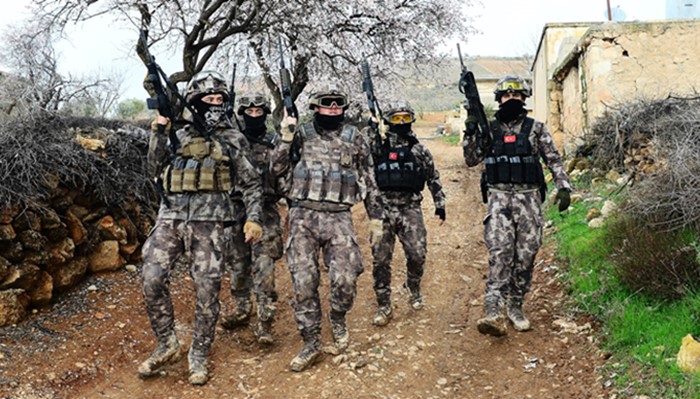Türkmen Terzi
Turkey has yet to achieve a sustainable peace with its largest ethnic group, the Kurds, who have sought greater democratic rights and self-rule since the collapse of the Ottoman Empire. Mustafa Kemal Atatürk, the founder of the Republic of Turkey, ordered his military to brutally suppress the large-scale Kurdish Sheikh Said rebellion in 1925 in southeastern Turkey. President Recep Tayyip Erdoğan, the strongest Turkish leader since Atatürk, initiated a political approach to the Kurdish issue in the early 2010s but has since then pursued a military solution to eliminate Kurdish armed groups. In recent years Turkey has intensified its war against the Kurdistan Workers’ Party (PKK) in Syria and Iraq, exploiting the weakness of its Arab neighbors.
Around 25 million Kurds live in the border region of Turkey, Iraq, Syria, Iran and Armenia. Iraqi Kurds established self-rule following the collapse of Saddam Hussein’s regime after the US-led war. Syrian President Bashar al-Assad has not controlled the Kurdish regions in Syria since the civil war began in 2011. Turkey, home to half the world’s Kurdish population, fears that Kurdish autonomous regions in Iraq and Syria may inspire Turkey’s Kurds to seek autonomy. As a result, Turkey frequently targets armed Kurdish groups — the Syrian Kurdish People’s Protection Units (YPG) and the affiliated Democratic Union Party (PYD), which Ankara views as offshoots of the PKK in these countries.
Turkey is attempting to prevent the unification of Kurdish cantons along its Syrian border, and many PKK members moved to Syria during Turkey’s peace process with the Kurds. For the last four decades Turkey has conducted military operations against the PKK in Turkey’s southeastern mountainous region and the Qandil Mountains in northern Iraq, where the PKK has a base. The PKK has been fighting the Turkish state since 1984 to establish independent or autonomous Kurdish rule within Turkey’s southeastern region. Initially, Turkish forces returned home after operations, but they have since then established a permanent presence in northern Syria following four military operations carried out since 2016. Turkey has built a significant presence in Iraq, including the Bashiqa base located 80 kilometers inland. The Syrian and Iraqi governments have long oppressed their Kurdish populations and fought against the establishment of autonomous Kurdish territories in their countries. However, these Arab nations appear more concerned about Turkey’s military offenses in their territories than the activities of Kurdish armed groups.
The Iraqi Kurdistan Regional Government (KRG) has developed a strong relationship with Turkey since gaining autonomy, but the KRG region remains seriously affected by Turkey’s ongoing targeting of PKK forces. International media have reported the devastating impact of the war between Turkey and PKK militants on Iraqi Kurdistan’s agricultural region of Duhok. Turkey is taking advantage of the political rift between the Iraqi central government and the KRG, continuing to station troops and deploy drones in the heart of Iraqi Kurdistan. According to an Iraqi media report, the Turkish army carried out a drone attack in the town of Chiladzi that killed three villagers on June 19, 2020. The recent Turkish drone attacks in Iraq have had a much more disastrous impact than previous incidents. Iraq’s Basnews reported that a suspected Turkish drone strike targeted Sulaymaniyah’s international airport on April 7, while Mazlum Kobane, commander of the Syrian Democratic Forces (SDF), was departing the airport for Rojava after having met with US military commanders in the city. Turkey shut down its airspace to flights to and from Sulaymaniyah following the PKK’s activities in the city. Sulaymaniyah is controlled by the Patriotic Union of Kurdistan (PUK), which was founded by Jalal Talabani in 1975 and is currently the second-largest party in the Kurdistan region of Iraq. The Talabani family shares power with the Barzani family’s Kurdistan Democratic Party (KDP) in Iraqi Kurdistan, and the families are well-known historical rivals. There are reports in Turkey regarding the US government becoming closer to the Talabani family in recent years since Washington believes the Barzani family may not be determined to fight for Kurdish independence.
Following Turkey’s military operations, PUK leader Bafel Talabani, son of the former president of Iraq, Jalal Talabani, has called on the ruling KDP to work toward achieving peace between Turkey and the PKK, ending four decades of active conflict.
Besides Turkey’s increasing military activities in Iraq, Erdoğan has been preparing a large-scale military operation in Syria to counter the Kurdish threat. However, he has failed to get a green light from Russia, the US or Iran for a military operation in Syria. The recent earthquakes in Turkey and the upcoming May elections have also delayed Turkey’s planned Syria operations. Erdoğan has attempted to meet with Assad to normalize relations, but Assad demands that Turkey withdraw its army from Syrian territories before engaging in direct peace talks. Turkey’s military activities have severely affected the economy, particularly agricultural activities, in the Turkish-controlled Syrian region.
Instead of ensuring greater political and human rights for the Kurdish population, Turkish rulers have tried to defeat the PKK over the decades. Tens of thousands of people have died as a direct result of the ongoing conflict between the PKK and Turkish forces. Millions of Kurds have been forced to leave their homes and settle in the ghettos of Turkey’s big cities such as Adana, İzmir and İstanbul. Turkey’s Kurdish-majority cities in the southeastern region have been left underdeveloped due to war. The Turkish army has recently intensified its war against the PKK in Iraq and Syria with the help of advanced drone technology. It seems that the Kurds in Syria and Iraq are currently facing the same fate as their kinsmen in Turkey as Ankara intensifies its military offensive against PKK forces in those countries.
Ironically, the Turkish army, NATO’s second largest, did not seriously fight the PKK within its borders and allowed them to leave Turkey during a peace process in 2013. However, it is now intent on hunting the PKK down in neighboring countries. The PKK serves as a convenient excuse for Turkey to invade Arab states.
